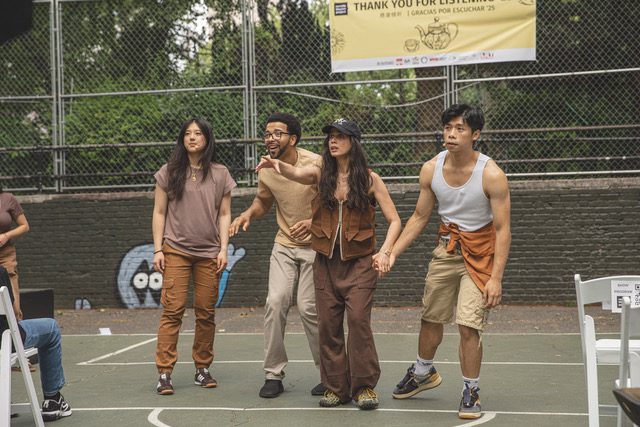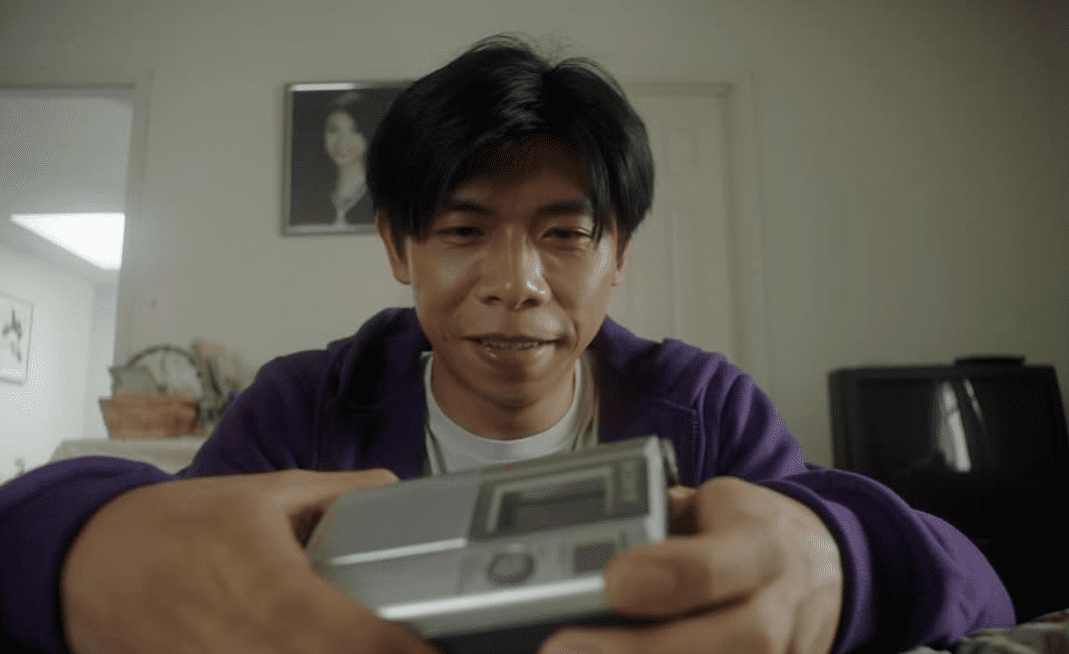For actor Andy Law, the path to the stage has been anything but linear. Born and raised in Hong Kong, educated in Tokyo, and now based in New York City, his journey reflects the tension and possibility of crossing cultures, languages, and artistic traditions. A chance encounter with Theater History at Waseda University sparked his curiosity about performance, while Martin Scorsese’s Taxi Driver revealed to him that acting could be less about spectacle and more about raw, lived truth. Since then, Law has immersed himself in theater and film, navigating the challenges of training in a new country and the complexities of building a career in the U.S. as a Chinese artist.
At HB Studio in New York, he found discipline, humility, and community through the rigors of the Uta Hagen Core Program. His fluency in Cantonese, Mandarin, and English has opened unexpected doors, but it has also pushed him to consider how identity, typecasting, and cultural expectation shape opportunity in the entertainment industry. Recent work, such as Tongues at JACK in Brooklyn, has deepened that exploration, asking how language shapes selfhood and how actors negotiate the space between personal and universal expression. Now, as he prepares to self-produce and perform his own play, Blue Bottle, at NYTheaterWinterFest, Law continues to push beyond labels and limitations, seeking to tell stories that resonate with the complexities of modern life while staying deeply personal.
What first inspired you to pursue acting, and how did your upbringing in Hong Kong shape your initial relationship with performance and storytelling?
I took a class about Theater History at Waseda University in Tokyo, and that was the first time I got intrigued about the evolution of performing arts. Movies had inspired me so much as well. Watching Taxi Driver by Martin Scorsese made me realize how similar my view of life was compared to Robert De Niro’s in Taxi Driver. His performance shocked me in the way that acting doesn’t have to be grand and performative. He was just being, submitting himself to Travis, executing the actions of a character who is a lonesome, extremely twisted city guy. I was still a sophomore in Tokyo at the age of 19. There were not many English-speaking drama clubs around, so I joined a Japanese one. Surely I felt very out of place as the only foreigner who barely spoke any Japanese. Then, eventually, I found a Shakespearean drama club in English where I felt a little more settled.
Growing up in Hong Kong, I didn’t enjoy HK TV drama (TVB) very much aside from all Stephen Chow’s movies. TV shows were sort of monopolized by one single channel, so I guess I grew tired of it. My parents encouraged me to take piano lessons and pursue music. As appealing as music can be, a kid like me was fed up by the responsibility that came with it. Besides, I remember one time I was writing a short story for homework at my aunt’s who’s a cram school teacher, and I got punished for imagining my mum passing away in an accident. “You can’t write that! I’m gonna tell your mom about it,” she said. Why did I write that? I truly don’t know till this day. I love my mom, but that doesn’t mean I can’t imagine her passing away. I think the weight of losing someone you love is exactly the reason why I should be allowed to write that. But society has a way of imposing stern taboos. That made me want to create without limitations. I wanted to be fully me and say what I want to say.

What has your training process in New York been like, and how has it expanded or challenged your approach to acting compared to your earlier experiences?
Studying in HB Studio was truly the first time I’m exposed to the theatre world. From body movements to voice to speech to Uta Hagen exercises, the constant drilling and critiques had harnessed my mental fortitude and discipline as an actor, understanding why it is important to work with technique and humility. The Hagen Core program allowed me to start my day every weekday from 9-3 with the same group of actors for a year. We grew together and sometimes challenged each other in a healthy way. I didn’t feel like I was the best actor there at all, as much as I wanted to be. But then I realized that’s not what it’s about. It’s so freeing and humbling when I found the joy of watching actors work in class. They also taught me the importance of self-observation, and this has been continuing till this moment.
As an actor from Hong Kong working in the American theater and film industries, what unique opportunities and challenges have you encountered?
A lot. I didn’t know that being able to speak both Cantonese, Mandarin, and English fluently can give me so many opportunities. It makes me appreciate my roots even more. Of course, being lucky enough to meet all these people along the way is definitely a blessing. Without the collaboration, I couldn’t have brought my originality to all the roles and shows. In acting classes, I was assigned some classic American roles, such as Tom Wingfield from The Glass Menagerie by Tennessee Williams. What a challenge that was for me to understand the culture and mindset of most people during the Great Depression. The fact that I still don’t know enough makes me feel like I didn’t work hard enough! Outside of classes, casting becomes more realistic or ethnically oriented, if you will. After all, I’m perceived very differently between America and Hong Kong. Some people in New York have been to Hong Kong and know me based on their knowledge; some people have never been to Hong Kong, so they get easily impressed because I can speak English in an American accent. Conversely, I’ve learned about people from different cultures through communicating and working with them. Fortunately enough, I was able to work on shows that weren’t really about my ethnicity and cultural background! It’s fortunate because stereotyping and typecasting can sometimes be a limitation to creativity. I don’t just want to play a Chinese person. Sometimes I want to play an alien or a pirate too.
Your recent collaboration on Tongues at JACK in Brooklyn centered on themes of language and cultural identity. What drew you to that project, and what did you take away from exploring “mother tongues” on stage? How do you balance honoring your cultural background while also creating work that resonates universally?
Tongues at JACK in Brooklyn was mainly about my mother tongue, discovering my relationship with English. Yibin Wang is a good friend who also worked with me on my first show in NYC. When he reached out to me about workshopping for Tongues, some questions came to me — will I be really excited with a show discovering my mother tongue, which I have been speaking since I was a baby? Will I be motivated to work on a documentary theater instead of the dramatized theater, which I was trained for? How is it going to fuel me as an actor? Turns out it had answered me more than those questions. I realized how it’s connected to the whole craft of acting. I’ve always approached a role by lending myself to the character. Who am I? Am I a different person when I speak Cantonese compared to English? Is the English-speaking Andy really more charming, more expressive, and more vulnerable, or have I been fooling myself? Maybe I have been glorifying English and Western culture because there’s this shame of my mother tongue in me. What if I just embrace it? What’s going to happen? Tongues has helped me start this journey that I think a lot of people would rather choose to avoid.

Your upcoming play, Blue Bottle, is described as deeply personal yet universally relatable. Can you share what the story means to you, and what excites you most about self-producing and performing it?
It really brings me back to my answer to the first question — my childhood experience had made me want to create without limitations. I wanted to be fully me and say what I want to say. As a man in his mid-20s from the first world, I’ve fantasized about war because all I’ve heard about war is from the news, textbooks, movies, and novels, but I’ve never actually experienced it. Perhaps romanticizing about war might not be the most virtuous thing you could do. The novel 1984 by George Orwell, who has inspired millions of readers, has told us that war can be constantly happening and everybody would have to believe it from the news! Radical, but very haunting and awakening. Where I’m from, or even in the United States today, people are gullible, vulnerable to the news, but rarely question it. I’m not going to sit on a high horse and make a comment on political activism, because what’s worth fighting for is always subjective to the mind. Sometimes in a collective fashion, sometimes individual. Blue Bottle is a dramatized version of that, plus my personal life. What I mean by that is — I’ve lost a meaningful relationship before; I’ve been swayed by propaganda; I’ve questioned my political beliefs. Perhaps we have all done these things. Humans are the only species on Earth capable of thinking about their thoughts. Most species only DO.
Self-producing and performing a play that I’ve written is the most indulgent thing I’ve done in my life so far. I love the idea of creating a character with my painting and giving it a voice. The burden worries me sometimes, but the excitement is there — being able to put up a play with the actors I’ve taken classes with. In an acting class, there are times when you really want to work with that particular person, although the scene partners are mostly assigned unless you request it. This HB gang has become my sanctuary where actors are not just co-workers. The camaraderie will be brought to its peak by working on this play together. At least that’s what I hope. For more information, please check the website.

